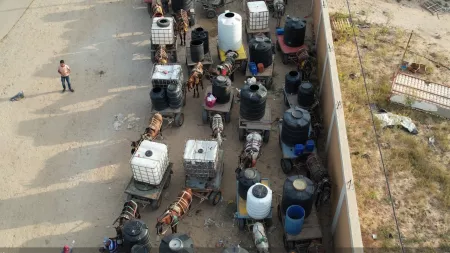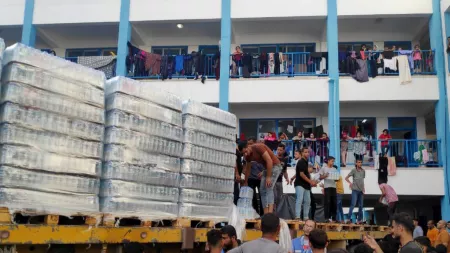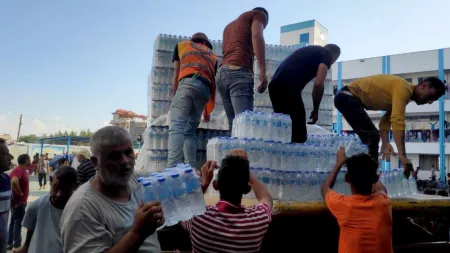November 21, 2023 – More than six weeks since the beginning of the crisis, civilians in Gaza are facing an acute water shortage, leading to an unprecedented situation with life and death implications for the 2.3 million people living there, 70% of whom – according to the U.N. Palestinian refugee agency (UNRWA) – have no access to clean water. In desperate conditions like these, the risk to children under five is particularly acute.
This extreme scarcity of water in Gaza has been brought on by a lack of fuel to run desalination plants and pump/deliver water; as well as raw sewage contaminating water supplies, damage to pipes, on-going bombing, and a grossly insufficient amount of humanitarian relief being allowed into the besieged area.
“Water and other aid has started coming in from Egypt, but it is not enough,” said Saaed Rafiq Al-Madhoun, CARE’s Emergency Response Coordinator in Gaza, of the assistance that has started to trickle in through the Rafah Crossing, the only entry pointy currently used for humanitarian assistance. “There is a huge need and the trucks coming are very limited. It’s like a drop in the ocean which didn’t change anything on the ground.”
CARE is calling for an immediate ceasefire and for unrestricted humanitarian access to reach survivors and help avert preventable deaths, including those caused by a lack of clean water.

A bigger risk than the bombing
“My biggest fear as a humanitarian assistance provider,” said Hiba Tibi, CARE’s Gaza and West Bank Country Director, “is that waterborne diseases and dehydration will be more destructive than the bombing.”
Julian Tung, a CARE Water and Sanitation expert with experience working in emergency contexts – including armed conflict, earthquakes, and typhoons – shared Tibi’s concerns that an extreme lack of hygiene and sanitation will result in many more deaths. As he explained: “I don't think it's an exaggeration because if this continues without some serious humanitarian intervention, this will be the case, the death toll will rise further and further because of the humanitarian conditions people are living in.” He added: “We have this huge number of people cramped in a very small area. They can't leave, they're stuck. And then you have this almost absolute lack of clean water, or very, very limited water. I've never seen anything quite like that at other emergencies I've been in.”
According to the World Health Organization (WHO), between 50 and 100 liters of water per person per day – for drinking, showering, hand washing, and cooking – are needed “to ensure that most basic needs are met, and few health concerns arise.” In a humanitarian crisis, Tung explained, that number can go down to 15 liters per person per day: “That's seen as the bare minimum for hygiene. It’s an absolute minimum.”
But the majority of people of Gaza today, including the hundreds of thousands living in cramped shelters, are only able to access a small fraction of that, if any at all, for daily use. This has led people not only to ration what little water they have, but also to seek out any source of water – safe or unsafe – that they can find.
“With that kind of level [of water], you see a lot of disease outbreaks related to poor hygiene starting,” said Tung. Specifically, he mentioned the risk of acute diarrhea, cholera, typhoid, and measles, as well as skin issues from scabies and lice. And those most in danger, he says, are children under five, with diarrhea being one of the biggest threats.
“It's diarrhea that's the [major] killer for children,” he said. “Without proper rehydration, with clean water, then it becomes a lot more serious. With children, they're not getting nutrition. Even if they're eating food, they're not retaining the nutrients because it's flushing through their system.” And for the children who do survive, Tung said, diarrhea can lead to developmental issues.
WHO recently reported more than 44,000 cases of diarrhea in Gaza, but the actual number is likely much higher.
Tung is also deeply concerned about the implications that a lack of clean water will have on Gaza’s crumbling health system: “They [medical personnel] need to wash hands for basic hygiene. Without that, the hospital also becomes the central point of disease spreading.”

From helpers to helpless
Early on in the conflict, CARE’s staff were able to procure water that could be delivered to hospitals and shelters. Approximately five weeks ago, Saaed Rafiq Al-Madhoun led an effort to distribute 72,000 bottles of clean water to places in need in southern Gaza.
“The water that CARE was able to distribute,” he said, “was used by families for their babies, and many still have it, as they prioritized and rationed their usage only for children.”
But today, there is barely any new clean water for the people of Gaza, including CARE team members.
Speaking of the daily living conditions of her colleagues in the enclave, Hiba Tibi said: “They are skipping meals. One of them is having half a portion of one meal, to secure food for his kids. The other is not at all consuming water. They kept all the bottled water that they had received weeks ago for baby formula, so they don’t give the baby contaminated water. But the rest of the family is using and consuming contaminated water.”
“We don't have water at all. Just every 10 or 15 days we see some water from the municipality pipeline, and it comes just only for one or two hours and we try to use it for washing our clothes, for taking a shower,” said Salwa Tibi, a CARE staff member from Gaza City who evacuated south a few weeks ago, of the highly-salinated and brackish water that her family and neighbors are able to access. “Just a shower every 15 days instead of a daily shower before that.”
For media inquiries, please contact Iolanda Jaquemet, Senior Humanitarian Communications Coordinator, CARE International via: [email protected].
